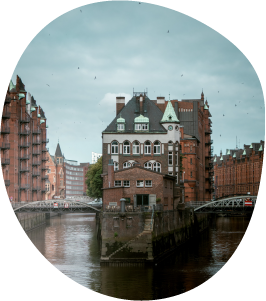VISIT Germany
Serious people, magnificent castles, fantastic hiking and crazy techno parties are all synonymous with this enormous and diverse nation.
Currency
€ - Euro (1€ ≃ 1,05$ ≃0,86£)
POPULATION
83 millions
MAIN LANGUAGE
German
AREA
357,592 km²
TIME ZONE
UTC+1 / UTC+2
FLAG
🇩🇪


EXPLORE BLACK FOREST
The Black Forest is a mountain range renowned for its dense evergreen forest and picturesque villages, often associated with the tales of the Brothers Grimm.

STROLL ALONG THE BERLIN WALL
With over 100 murals from international artists, the East Side Gallery stands out among the locations where you can still see remnants of the Berlin Wall.

VISIT FAIRYTALE-LIKE CASTLES
Neuschwanstein Castle is a dream construction surrounded by a beautiful landscape, that even inspired Walt Disney.

SOAK IN HAMBURG
Hamburg is a city of water, located where the River Elbe widens into the ocean and is home to a wide harbour and nearly 2500 bridges.

PARTY IN BERLIN
The hipster capital of Germany is home to top-notch museums, interesting neighbourhoods, and some of Europe's best nightlife.
Pick a German destination

Berlin
One of the most creative, hip, progressive cities in Europe, if not the world

Hamburg
Germany's 'Gate to the world' thanks to its gigantic harbour
Prepare your trip to Germany
💡 Why visit Germany?
Germany offers a captivating blend of historic landmarks, dynamic cities, and scenic landscapes. From the fairytale castles of Bavaria and medieval old towns to modern metropolises like Berlin and Frankfurt, the country is packed with cultural, architectural, and culinary treasures. It’s also known for its efficient transport, festive traditions, and varied regions, from the Alps to the North Sea.
🪪 Do I need a visa to visit Germany?
Germany is part of the Schengen area. Citizens of the EU, USA, Canada, Australia, and many other countries can enter visa-free for up to 90 days within a 180-day period. However, some nationalities do require a visa. It’s best to check with the nearest German embassy or consulate for the most up-to-date information specific to your situation.
IMPORTANT NOTE: The information below is provided merely as an indication and applies for short-term tourism visa purposes only. Before your trip to Germany, or if you are planning to come to Germany for another purpose (work, studies, …), check the official information on the European Commission website’s page about Schengen visa application: https://www.home-affairs.ec.europa.eu/
⏳ Visa-free but limited to maximum 90 days for a period of 180 days if you are a citizen of one of the following countries: Albania; Andorra; Antigua and Barbuda; Argentina; Australia; Austria; Bahamas; Barbados; Belgium; Bosnia and Herzegovina; Brazil; Brunei; Bulgaria; Canada; Chile; Colombia; Costa Rica; Croatia; Czechia; Denmark; Dominica; El Salvador; Estonia; Finland; France; Georgia; Germany; Greece; Grenada; Guatemala; Honduras; Hong Kong; Hungary; Iceland; Israel; Italy; Japan; Kiribati; Kosovo; Latvia; Liechtenstein; Lithuania; Luxembourg; Macau; Malaysia; Malta; Marshall Islands; Mauritius; Mexico; Micronesia; Moldova; Monaco; Montenegro; Netherlands; New-Zealand; Nicaragua; North Macedonia; Norway; Palau; Panama; Paraguay; Peru; Poland; Portugal; Romania; Saint Kitts and Nevis; Saint Lucia; Saint Vincent and the Grenadines; Samoa; San Marino; Serbia; Seychelles; Singapore; Slovakia; Slovenia; Solomon islands; South Korea; Spain; Sweden; Switzerland; Taiwan; Timor-Leste; Tonga; Trinidad and Tobago; Tuvalu; Ukraine; United Arab Emirates; United Kingdom; United States of America; Uruguay; Vatican; Venezuela
🛂 Visa required if you are a citizen of one of the following countries: Afghanistan; Algeria; Angola; Armenia; Azerbaijan; Bahrain; Bangladesh; Belarus; Belize; Benin; Bhutan; Bolivia; Botswana; Burkina Faso; Burundi; Cambodia; Cameroon; Cape Verde; Central African Republic; Chad; China; Comoros; Congo; Congo (Dem. Rep); Cote d’Ivoire (Ivory Coast); Cuba; Djibouti; Dominican Republic; Ecuador; Egypt; Equatorial Guinea; Eritrea; Eswatini; Ethiopia; Fiji; Gabon; Gambia; Ghana; Guinea; Guinea-Bissau; Guyana; Haiti; India; Indonesia; Iran; Iraq; Jamaica; Jordan; Kazakhstan; Kenya; Kuwait; Kyrgyzstan; Laos; Lebanon; Lesotho; Liberia; Libya; Madagascar; Malawi; Maldives; Mali; Mauritania; Mongolia; Morocco; Mozambique; Myanmar; Namibia; Nauru; Nepal; Niger; Nigeria; North Korea; Oman; Pakistan; Palestine; Papua New Guinea; Philippines; Qatar; Russia; Rwanda; Sao Tome and Principe; Saudi Arabia; Senegal; Sierra Leone; Somalia; South Africa; South Sudan; Sri Lanka; Sudan; Suriname; Syria; Tajikistan; Tanzania; Thailand; Togo; Tunisia; Turkey; Turkmenistan; Uganda; Uzbekistan; Vanuatu; Vietnam; Yemen; Zambia; Zimbabwe
⛅ When is the best time to visit Germany?
❄️ December – February: Winter is cold, but magical thanks to Germany’s world-famous Christmas markets, especially in cities like Dresden and Nuremberg. Temperatures range from -1°C (30°F) to 5°C (41°F), with snowfall common in the south.
🌱 March – May: Spring brings blooming parks, mild temperatures, and fewer crowds—perfect for city sightseeing or countryside walks. Outdoor cafés begin to open, and festivals start returning.
☀️ June – August: Summer is warm and lively, with temperatures between 15°C (59°F) and 25°C (77°F). It’s festival season, with open-air events, river cruises, and beer gardens in full swing. Popular destinations can be crowded—booking in advance is recommended.
🍂 September – November: Autumn sees cooler weather and vibrant fall foliage, especially along wine routes and forested areas. September and October are harvest and wine festival months, while late November kicks off the Christmas market season.
🚉 How to get around Germany?
Germany has one of Europe’s best transport systems:
🚌 Buses: Long-distance buses like Flixbus offer budget-friendly connections between cities. Regional buses serve smaller towns and are often coordinated with local train services.
🚂 Trains: Train travel is excellent in Germany. The Deutsche Bahn network includes high-speed ICE trains that connect major cities like Berlin, Munich, and Cologne. Regional trains cover smaller towns and scenic routes.
🚗 Car Rental: Renting a car is ideal for exploring regions like Bavaria, the Romantic Road, or the Black Forest. Roads are well-maintained, and the autobahn allows for high-speed travel, but be aware of speed limits in marked zones. An International Driving Permit (IDP) is not required if your license is in Latin script.
💳 Can I use bank cards or cash for payments in Germany?
While card payments are increasingly common, many small businesses and restaurants still prefer cash. Visa and Mastercard are widely accepted, but some places do not take American Express. It’s advisable to carry some euros, especially in rural areas or markets.
🔌 What type of plugs and voltage does Germany use?
Germany uses plug types C and F, both with two round pins. The standard voltage is 230V and the frequency is 50Hz.
If needed, you can order an universal travel plug adapter here.
🪙 Is tipping customary in Germany?
Tipping is appreciated and customary in restaurants, cafés, and taxis. A tip of around 5-10% is typical. In casual settings, rounding up the bill is also acceptable.
🥛 Is it safe to drink tap water in Germany?
Tap water is safe to drink throughout Germany.
📅 When are public holidays and store closing days in Germany?
In Germany, some stores are closed on Sundays. There are 5 national public holidays in Germany:
- New Year’s Day (January 01)
- Good Friday and Easter Monday (dates vary)
- Labour Day (May 01)
- German Unity Day (October 03)
- Christmas Day (December 25)
Other holidays vary by state, such as Corpus Christi or All Saints’ Day.
On these days, most businesses and offices will be closed, and many attractions may be shut or have limited opening hours.
🚦 What are the speed limits in Germany?
In Germany, traffic drives on the right-hand side of the road. The main speed limits are as follows:
- 50 kph / 30 mph in urban areas
- 100 kph / 62 mph on rural areas
- No general speed limit on certain stretches of the autobahn (unless otherwise indicated), though 130 kph (81 mph) is recommended
During adverse weather (rain, fog, etc.), the speed limits are lowered.
💬 What are some basic German words I should know?
- Hello (informal) = Hallo
- Good day = Guten Tag
- Goodbye = Auf Wiedersehen
- Yes = Ja
- No = Nein
- Thank you = Danke
- Please = Bitte
- You’re welcome = Gern geschehen
- Excuse me = Entschuldigung
- Day = Tag
- Night = Nacht
- Good evening = Guten Abend
- Goodnight = Gute Nacht
- Mister = Herr
- Ma’am = Frau
- Street = Straße
- Road = Weg
💡 Tip: With the GoogleTranslate app, you can download the German language to use it even offline!
🛡️ Is it safe to travel in Germany?
Germany is generally very safe for travelers. Public transport, cities, and tourist areas are well-policed and well-lit. Still, it’s important to take the usual precautions:
Secure Your Belongings: Pickpocketing can occur in crowded areas, especially train stations and festivals.
Emergency Numbers: Dial 112 anywhere in Germany for police, fire, or medical assistance.










